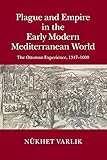Plague and empire in the early modern Mediterranean world : the Ottoman experience, 1347-1600 / Nükhet Varlik, Rutgers Univeristy-Newark.
Material type: TextPublisher: New York, NY : Cambridge University Press, 2017Description: xviii, 336 pages : illustrations ; 24 cmContent type: text Media type: unmediated Carrier type: volumeISBN: 9781108412773 (paperback)Subject(s): Plague -- Turkey -- Epidemiology -- History | Black Death -- Turkey -- History | Plague -- Environmental aspects -- Turkey -- History | Plague -- Social aspects -- Turkey -- History | Plague -- Political aspects -- Turkey -- History | Imperialism -- Social aspects -- Turkey -- History | HISTORY / Middle East / General | Turkey -- History -- Ottoman Empire, 1288-1918 | Turkey -- Environmental conditions -- HistoryDDC classification: 614.5/73209561 LOC classification: RC179.T9 | V37 2015Other classification: HIS026000 Online resources: Cover image
TextPublisher: New York, NY : Cambridge University Press, 2017Description: xviii, 336 pages : illustrations ; 24 cmContent type: text Media type: unmediated Carrier type: volumeISBN: 9781108412773 (paperback)Subject(s): Plague -- Turkey -- Epidemiology -- History | Black Death -- Turkey -- History | Plague -- Environmental aspects -- Turkey -- History | Plague -- Social aspects -- Turkey -- History | Plague -- Political aspects -- Turkey -- History | Imperialism -- Social aspects -- Turkey -- History | HISTORY / Middle East / General | Turkey -- History -- Ottoman Empire, 1288-1918 | Turkey -- Environmental conditions -- HistoryDDC classification: 614.5/73209561 LOC classification: RC179.T9 | V37 2015Other classification: HIS026000 Online resources: Cover image | Item type | Current library | Call number | Status | Date due | Barcode |
|---|---|---|---|---|---|
 Books
Books
|
The BIAA David H. French Library Shelf 62 - Reading Room | H2n VARLI 32486 | Not for loan | BOOKS-000000025364 |
Includes bibliographical references (pages 295-325) and index.
Part I. Plague : History and Historiography -- 1. A natural history of plague -- 2. Plague in Ottomanist and non-Ottomanist historiography -- 3. The Black Death and its aftermath (1347-1453) -- Part II. Plague of Empire -- 4. The first phase (1453-1517) : plague comes from the West -- 5. The second phase (1517-70) : multiple plague trajectories -- 6. The third phase (1570-1600) : Istanbul as plague hub -- Part III. Empire of Plague -- 7. Plague transformed : changing perceptions, knowledge, and attitudes -- 8. The state of the plague : politics of bodies in the making of the Ottoman state -- Epilogue.
"This is the first systematic scholarly study of the Ottoman experience of plague during the Black Death pandemic and the centuries that followed. Using a wealth of archival and narrative sources, including medical treatises, hagiographies, and travelers' accounts, as well as recent scientific research, Nükhet Varlik demonstrates how plague interacted with the environmental, social, and political structures of the Ottoman Empire from the late medieval through the early modern era. The book argues that the empire's growth transformed the epidemiological patterns of plague by bringing diverse ecological zones into interaction and by intensifying the mobilities of exchange among both human and non-human agents. Varlik maintains that persistent plagues elicited new forms of cultural imagination and expression, as well as a new body of knowledge about the disease. In turn, this new consciousness sharpened the Ottoman administrative response to the plague, while contributing to the makings of an early modern state"-- Provided by publisher.
